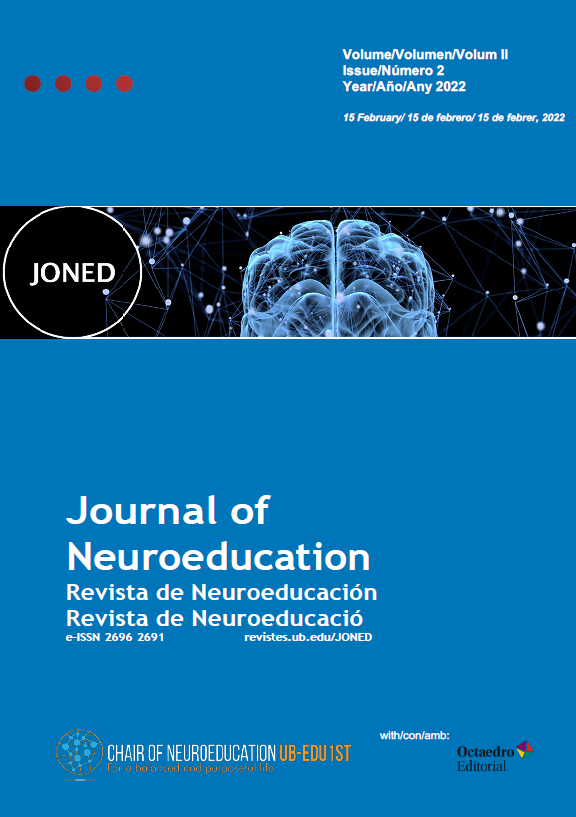Aprendizaje organizado (AO): de la simplicidad de las tareas de aprendizaje a la complejidad de las tareas competenciales en Educación Física
DOI:
https://doi.org/10.1344/joned.v2i2.37395Keywords:
organized learning, complexity, simplicity, competency activities, thinking based learning (TBL), doing based learning (LBD)Abstract
With the aim of responding to some of the new educational perspectives for the 21st century and where the concept of competence is its main axis 1, emphasis is placed on the difficulties of PE teachers to be able to create complex tasks where students develop said competences. In this sense, two paradigms are interpreted: simplicity and complexity in the educational context of Physical Education, the transmission of information in learning tasks and “learning by doing (LBD)” and “learning by thinking” (LBT). Taking into account the enormous difference of the two paradigms, they are united through the theoretical explanation of the concept: organized learning (OA). This tries to approximate both paradigms in order to help teachers in the development of good competency practices.
References
Rodrigues ZB. Educación: Un estudio basado en el informe de la UNESCO sobre los cuatro pilares del conocimiento. Revista Científica Multidisciplinar Núcleo do Conhecimento. 2021 Jan 18; 53-60.
Lluch, L., Fernández-Ferrer, M., Pons, L. i Cano, E. Competencias profesionales de los egresados universitarios: estudio de casos en cuatro titulaciones. QURRICULUM. Revista de Teoría, Investigación y Práctica Educativa, vol. 30, juliol de 2017, p. 49-64. 2017
Isabel M, Angeles M, Arabella Villalobos Crespo. Manual de técnicas y terapias cognitivo-conductuales. Bilbao: Desclée De Brouwer, [Etc; 2017.
Mayer R, Aplicando la ciencia del aprendizaje. Ed: Grao; 2020.
Morin E. La mente bien ordenada. Ed: Seix Barral; 2000.
Swartz R, Moguiness C. Developing and Assessing Thinking Skills: Final Report Part 1, Literature Review and Evaluation Framework. 2014. DOI:10.13140/RG.2.1.4917.6163.
Seirul lo F. Valores educativos del deporte. In: La iniciación deportiva y el deporte escolar. INDE; 1998. p. 61–75.
Seirul·lo F. Una línea de trabajo distinta. Revista de Entrenamiento Deportivo, 23(4): p. 13-18.
Tarragó JR, Massafret-Marimón M, Seirul·lo F, Cos F. Entrenamiento en deportes de equipo: el entrenamiento estructurado en el FCB. Apunts Educación Física y Deportes. 2019 Jul 1;(137):103–14.
Pons E, Martin A, Guitart M, Guerrero I, Tarragó JR, Seirul·lo F, et al. Entrenamiento en deportes de equipo: el entrenamiento optimizador en el Fútbol Club Barcelona. Apunts Educación Física y Deportes. 2020 Oct 1;(141):55–66.
Schöllhorn W, Hegen P, Davids K. The Nonlinear Nature of Learning - A Differential Learning Approach. The Open Sports Sciences Journal. 2012 Sep 13;5 (1):100–12.
Dehaene S, Sevilla Y, Padilla L, D'alessio MJ. ¿Cómo aprendemos?: los cuatro pilares con los que la educación puede potenciar los talentos de nuestro cerebro. Buenos Aires: Siglo Veintiuno; 2019.
Codina MJ. Neuroeducación en virtudes cordiales [Internet] [Tesis]. [Universitat de Valencia]; 2014 [cited 2021 Nov 12]. https://bit.ly/32wNodY
Ruiz H. ¿Cómo aprendemos?: una aproximación científica al aprendizaje y la enseñanza. Barcelona: Editorial Graó, De Irif; 2020.
Sebastiani EM, Campos-Rius J. L’esport ens ofereix una oportunitat fantàstica per a treballar competències en infants i joves. Educació 360. 2019.
Downloads
Published
Issue
Section
License
Copyright (c) 2022 Joan Subirats

This work is licensed under a Creative Commons Attribution-NonCommercial 4.0 International License.
The authors who publish in this journal agree to the following terms:
a. Authors retain copyright and grant the journal the right of first publication
b. Texts will be published under a Creative Commons Attribution Non Commercial License that allows others to share the work, provided they include an acknowledgement of the work’s authorship, its initial publication in this journal and the terms of the license, and not for commercial use.



